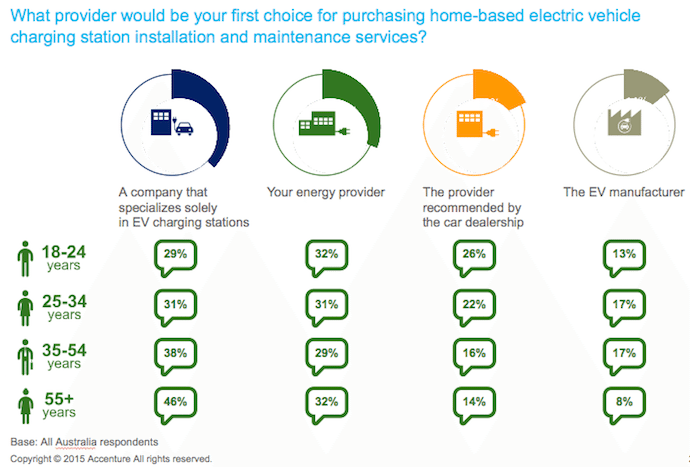
A new report has revealed just how eager Australian consumers are to embrace energy technologies like solar and storage that offer them cheaper electricity and greater energy independence – and it illustrates how important it is for power industry incumbents to meet this new wave of demand, or lose their grip on the market.
The report, published on Monday by Accenture and based on an extensive survey, found that more than half of Australian consumers would consider becoming power self-sufficient, by investing in technology like solar panels and battery storage, and to avoid buying energy from their energy provider.

And while this might seem like worrying news for Australia’s energy retailers and generators, the vast majority of these people – 86 per cent – also said they would buy back-up power services from their utility to minimise the risk of having to go without energy.
In addition, a majority of consumers surveyed said they would be interested in taking up a wide range of energy-related services, including solar installation and maintenance, electric vehicle charging and demand management programs – if they were offered by their energy company.


As we heard at last week’s Disruption and the Energy Industry conference in Sydney, the big power gentailers in Australia are finally starting to twig to this new stream of customer interest.
Having resisted the shift to distributed solar generation – a shift that has had a significant impact on demand patterns, the need for added infrastructure, and thus energy industry revenues – major power companies are rapidly adjusting their business models to make the most of it.
“We’ve already lost a lot of bark in this game,” Origin Energy’s head of solar Phil Mackey told the conference, in a speech signalling his company’s intent to become a leading player in the rooftop solar market.
“There are a lot of poor signals, and sources of information out there. We need to fix that …to manage the risk. Leave it in our hands, we’re in a better position to manage it.”
But there is a bit of work to be done – as the Accenture report notes and the graph below illustrates – in the department of customer trust, satisfaction and loyalty.

When asked what organisations they trusted for information about optimising energy consumption, only one-third of respondents named utilities or energy providers, and even less trusted retailers to provide this service.
It is this disaffection with the traditional energy companies that has helped boost the popular success of digital electricity retail upstarts like Powershop.

Ben Burge, the CEO of Powershop, told the same RenewEconomy-hosted conference last week that the “hatred” of traditional power companies, both networks and retailers, was palpable among consumers, and in particular the younger generations.
And he’s suspicious about the motives of the “energy cartel”, as he called them, driving their aggressive new rooftop solar and storage campaigns.
“I’m worried about the sales machine that will see people run the risk of buying the wrong product at the wrong time for the wrong reasons,” he says, and for “anaemic financial returns.”
“This sector’s been riddled with lies and deception for so long. … The customer doesn’t know the good from the bad, and shouldn’t have to care.
“The average 20-something has no prior experience. Their customer expectations are being driven by their experience on Facebook.
As you can see in the Accenture chart below, the number of consumers using social media as the main communication line between them and their energy retailer looks likely to double in the next two years. (Green is “already using”, orange is “will use in the next 12 months to 2 years.)

“It’s all about instantaneous, personalised, real-time customer service, software, backed up with a human service.”
As you can see in the image below, AGL is on Facebook, where it is actively advertising its “cheap” solar systems. Whether it can provide the follow-up “software and human” services Burge mentions remains to be seen.

Still, on matters like the development of microgrids, and the management of data, the traditional power companies seem to have an advantage.
“While knowledge about microgrids among consumers is low, utilities expect them to proliferate in the next five years,” says the report. And “consumers see energy providers as the most suited to install, maintain and manage a microgrid.”


Sophie is editor of One Step Off The Grid and deputy editor of its sister site, Renew Economy. Sophie has been writing about clean energy for more than a decade.


